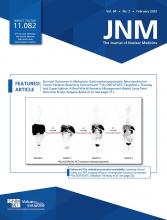REPLY: We are grateful for the commentary on our paper (1) by Dr. Stabin and agree with almost everything he says (2). We would, however, take issue with his characterization of our conclusions, especially the “sour note that we should not do any dosimetry at this time….” This is certainly not the conclusion we intended to convey and is difficult to reconcile with the fact that the paper is devoted largely to how to do dosimetry.
We probably all agree that the main goal of performing dosimetry is to improve clinical outcomes. This means it must, in some way, affect the treatment prescription. A patient-individualized, dosimetry-driven treatment prescription will almost certainly be different from a standard “one-size-fits-all” treatment prescription. Most medical physicists and nuclear medicine physicians likely agree that an individualized approach would be better, but it remains to be determined how much better in terms of objective clinical endpoints such as progression-free survival and overall survival. Other stakeholders (e.g., medical oncologists, pharma sponsors, medical insurers, administrators, and perhaps even patients themselves) may resist the additional time and effort, expense, and logistic complexity unless there is a demonstrable and significant cost benefit. Compelling data from randomized, multicenter clinical trials comparing a dosimetry-based prescription with simpler alternatives are therefore essential for broad acceptance of dosimetry-based radiopharmaceutical therapy. Although specialists in our field may not need convincing, the greater community very much does.
Footnotes
Published online Nov. 10, 2022.
- © 2023 by the Society of Nuclear Medicine and Molecular Imaging.







